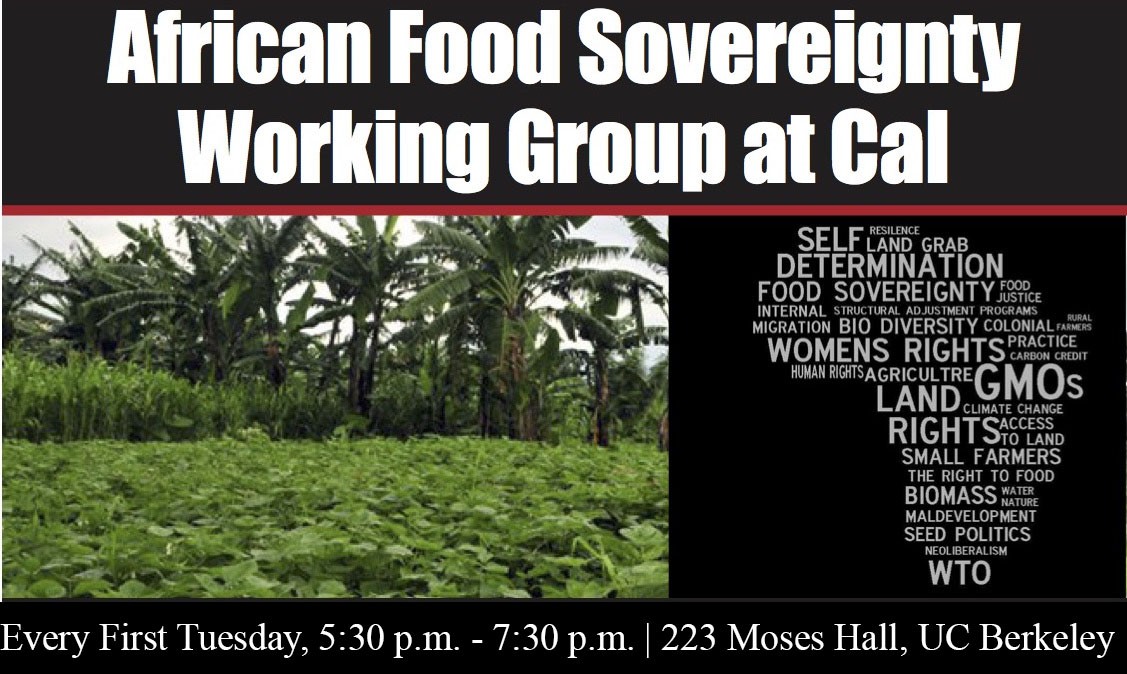
African Food Sovereignty Working Group at Cal
The Center for African Studies and the Haas Institute for a Fair and Inclusive Society at UC Berkeley will launch the African Food Sovereignty Working Group at Cal on February 3.
The African Food Sovereignty Working Group aims to engage the challenges and alternatives of food insecurity as experienced by the peoples of the African continent. Each month, the working group will examine the historical and contemporary debates, discourse, and movements related to the multiplicity and complexity of Africa’s food systems.
We aim to engage the challenges and alternatives of food insecurity as experienced by the peoples of the African continent. We will examine the historical and contemporary debates, discourse, and movements related to the multiplicity and complexity of Africa’s food systems.
Monthly discussions will focus on specific issues and themes related to African food systems, such as the African Green Revolution; Alternatives to Industrial Agriculture, Political Economy of the Food System, Natural Resource Grabs i.e. Land & Seed grabs, etc. The working group will provide readings in advance to focus our roundtable discussions. Guest speakers will address these issues. The group will also focus on disseminating information and engage critically in debates on these issues within academia and beyond.
The working group will meet monthly, on the first Tuesday of each month (5:30-7:00PM) at 223 Moses Hall.
For more information, please contact the facilitators, Liz Boner with CAS, and Elsadig Elsheikh with the Haas Institute.
Readings
Fourth Meeting
Tuesday May 5, 2015, 5:30-7:00PM at Moses Hall
African Food Sovereignty Working Group meeting on Tuesday May 5th, 2015, at 5:30-7:00PM. UC Berkeley Moses Hall
Please join us, as we will be focusing the politics of Seeds. In preparation for our discussion, please
(1) Read the introduction and chapter on Africa in the recent report by Via Campesina called, "Seed Laws that Criminalize Farmers: Resistance and Fight Back" http://www.grain.org/article/entries/5142-seed-laws-that-criminalise-farmers-resistance-and-fightback
(2) Review the poster: http://viacampesina.org/en/images/stories/pdf/Seed%20laws%20poster%20EN%202MEG.pdf . Bring reflections as we consider our various roles in supporting local efforts to protect seeds.
(3) If possible, research examples of seed laws or campaigns to protect seeds in one African country. Bring your example to share in our meeting.
(4) Optional:
Watch the video, "Seeds of Freedom" https://vimeo.com/43879272
1. Millennium Development Goals: A Critique From South. Samir Amin (2006)
2. Women of Via Campesina International Manifesto, IV Women’s Assembly-Jakarta (June 2013)
Second Meeting (March 3, 2015):
1. Samir Amin (2006) Millennium Development Goals: A Critique from the South
2. Canfield and Bereano (2015) Yes, we have no bananas
3. We would like to discuss the case study of the GMO banana initiative in relation to
our readings from last week (Nyeleni Declaration and Via Campesina's declaration of
Food Sovereignty) and Amin's critique of MDG's, especially in light of the UN's
proposed Sustainable Development Goals.
First meeting (February 3, 2015):
1. 1996 Declaration of Food Sovereignty: La Via Campesina
2. Nyeleni Declaration 2007 (Synthesis Report)
3. The Agra Green Revolution-Rwanda: Video on AGRA.
Power point first meeting (v.2).pptx
OPTIONAL: For more information on AGRA (Alliance for a Green Revolution for Africa) see: Bill and Melinda Gates Foundation and AGRA website
The African Food Sovereignty Working Group at Cal is organized by the Global Justice Program at Haas Institute for a Fair and Inclusive Society and the Center for African Studies.

